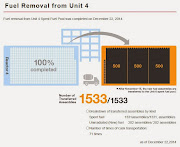A post at Zero Hedge has made most sense to me so far regarding the turmoil in Ukraine after the West has successfully incited the opposition to President Yanukovich and after Russia has entered Crimea.
Putin’s decision to back himself into this corner has been derided by the Western media as a strategic blunder but it is actually a textbook example of realpolitik. Putin has created a situation where the West’s only alternative to acquiescing in the Russian takeover of Crimea is all-out war.
Accept Putin's terms, or an all-out war.
In another word, checkmate for the West?
From Zero Hedge (3/3/2014; emphasis is mine):
Realpolitik In Ukraine
Submitted by Anatole Kaletsky via Evergreen-Gavekal
Oscar Wilde described marriage as the triumph of imagination over intelligence and second marriage as the triumph of hope over experience. In finance and geopolitics, by contrast, experience must always prevail over hope and realism over wishful thinking. A grim case in point is the Russian incursion into Ukraine. What makes this confrontation so dangerous is that US and EU policy seems to be motivated entirely by hope and wishful thinking. Hope that Vladimir Putin will “see sense,” or at least be deterred by the threat of US and EU sanctions to Russia’s economic interests and the personal wealth of his oligarch friends. Wishful thinking about “democracy and freedom” overcoming dictatorship and military bullying.
Financial markets cannot afford to be so sentimental. While we should always recall at a time like this the famous advice from Nathan Rothschild to “buy at the sound of gunfire,” the drastically risk-off response to weekend events in Ukraine makes perfect sense because Russia’s annexation of Crimea is the most dangerous geopolitical event of the post-Cold War era, and perhaps since the Cuban Missile crisis. It can result in only two possible outcomes, either of which will be damaging to European stability in the long-term. Either Russia will quickly prevail and thereby win the right to redraw borders and exercise veto powers over the governments of its neighbouring countries. Or the Western-backed Ukrainian government will fight back and Europe’s second-largest country by area will descend into a Yugoslav-style civil war that will ultimately draw in Poland, NATO and therefore the US.
No other outcome is possible because it is literally inconceivable that Putin will ever withdraw from Crimea. To give up Crimea now would mean the end of Putin’s presidency, since the Russian public, not to mention the military and security apparatus, believe almost unanimously that Crimea still belongs to Russia, since it was only administratively transferred to Ukraine, almost by accident, in 1954. In fact, many Russians believe, rightly or wrongly, that most of Ukraine “belongs” to them. (The very name of the country in Russian means “at the border” and certainly not “beyond the border”). Under these circumstances, the idea that Putin would respond to Western diplomatic or economic sanctions, no matter how stringent, by giving up his newly gained territory is pure wishful thinking.
Putin’s decision to back himself into this corner has been derided by the Western media as a strategic blunder but it is actually a textbook example of realpolitik. Putin has created a situation where the West’s only alternative to acquiescing in the Russian takeover of Crimea is all-out war. And since a NATO military attack on Russian forces is even more inconceivable than Putin’s withdrawal, it seems that Russia has won this round of the confrontation. The only question now is whether the new Ukrainian government will accept the loss of Crimea quietly or try to retaliate against Russian speakers in Ukraine—offering Putin a pretext for invasion, and thereby precipitating an all-out civil war.
(Full article at the link)
The United Kingdom has already backed out of trade sanctions against Russia over Crimea, as it fears the impact on global economic recovery.
(What recovery? 99.9% would ask...)




 Tokyo Time
Tokyo Time
![[Most Recent Quotes from www.kitco.com]](http://www.kitconet.com/charts/metals/gold/t24_au_en_usoz_2.gif)


